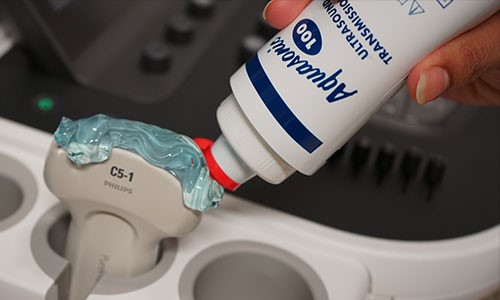Ultrasound
Reviewed by Danielle Nixon (Radiology Manager) and Lisa Serevena (Quality Lead Diagnostic Radiology)
Ultrasound is a non-invasive scan that uses sound waves to create live images from the inside of the body.

What is an ultrasound?
An ultrasound is a scan used to monitor and diagnose conditions in many parts of the body, without the use of radiation. An ultrasound scan uses high-frequency sound waves to produce live images of the inside of the body.
How will I know if I need an ultrasound?
If you require an ultrasound, your healthcare professional will refer you. An ultrasound is ideal for looking at anything not blocked by bone or buried deep within your body and is used within a wide range of specialities/examinations including:
- Breast ultrasound to investigate lumps or other abnormalities
- Doppler ultrasound to diagnose and find the source of varicose veins
- Gynaecological ultrasound to assess polyps, cysts, and fibroids
- Musculoskeletal (MSK) ultrasound to scan muscle, joints, tendons, and ligaments
- Prenatal ultrasound to check the health and development of the baby
- Ultrasound to look at major organs such as the heart, stomach, liver, and kidneys
How can I book an ultrasound?
To book an ultrasound, you will need a referral from a healthcare professional. If you have an outpatient consultation with a Nuffield Health consultant, they will refer you for a scan if clinically appropriate. You can also use a referral from your own GP or alternative healthcare professional, just email your referral to your chosen Nuffield Health hospital and a member of the team will call you back.
How should I prepare for an ultrasound?
For some scans, you may be asked not to eat before the procedure. If you are having your uterus or bladder scanned, you may be asked to attend the appointment with a full bladder. This allows better visualisation of the pelvic organs and there will be a toilet nearby so you can empty your bladder immediately after these scans. Please ensure that you thoroughly read any preparation instructions sent to you prior to your appointment.
What happens during an ultrasound?

During your scan, a probe is passed over the relevant area of your body. There are three main types of ultrasound scan:
- External – a clear, cool gel is spread on the area to be scanned the probe is moved back and forth over the area. You may be asked to take deep breaths or to move into different positions to get different images.
- Internal – the probe is inserted into the body, such as with a transvaginal scan
- Endoscopic – a small probe is attached to the end of an endoscope, which is passed through the mouth, down the oesophagus and into the stomach.
The sound waves bounce off internal organs and are passed back through the probe to a computer. The computer turns these sound waves into highly detailed images in real time, shown on the monitor.
An ultrasound scan is painless, but depending on the type of ultrasound, there may be some slight discomfort. A consultant radiologist will perform the scan and a healthcare assistant will be in the room to support you and the consultant.
Are ultrasounds safe?
Ultrasound scanning isn’t dangerous and has no known side effects. Unlike other scans, such as CT and MRI scans, it has zero ionising radiation, which is why it’s safe to use during pregnancy.
How long does an ultrasound take?
The procedure can take between 15 and 30 minutes. Everything will be explained to you before the examination begins.
How/when will I receive my results?
Your results will be verified by a Radiologist and sent to your referring healthcare professional within a week of your appointment. Times may vary for specialist examinations, so we recommend checking with the hospital team before you leave. Your referrer may recommend a follow-up appointment to discuss your results.
Ways to pay
Nuffield Health promise
Our prices are all-inclusive. We will equal any comparable price. There are no time limits on your aftercare.
Paying for yourself
There are no hidden costs in our treatment prices. The price you see is the price you pay.
Find out morePersonal medical loan
Spread the cost of your treatment with a 6, 10 or 12 month 0% personal medical loan.
Find out moreMedical insurance
We work with you and your insurance provider to get you the treatment you need quickly
Find out more